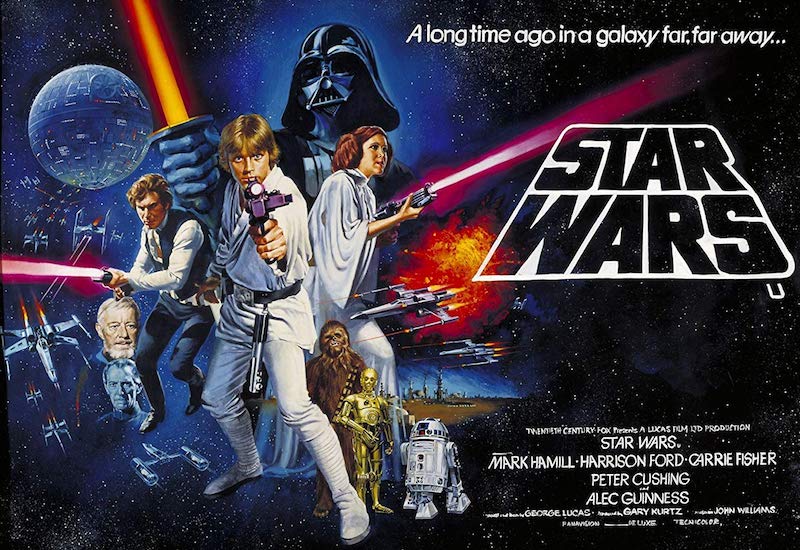Classic Star Wars: Did Han Shoot First? (How Should We Interpret Art?)
Episode #1 of the course Sci-Phi: Philosophy through science fiction by David Kyle Johnson, PhD
Hello, my name is David Kyle Johnson. I am a professor of philosophy at King’s College in Wilkes-Barre, Pennsylvania, and a professor for The Teaching Company’s “The Great Courses.” I lecture and publish prolifically on the intersection of philosophy and popular culture (check out my profile teacher’s page if you’d like to know more), and for the next ten days, I’d like to elaborate on the intersection of philosophy and science fiction.
Science fiction is often dismissed as juvenile escapism. In reality, it finds its origins in philosophy and is one of the primary ways we engage with the deepest philosophical questions: Do we have free will? Could machines think? Could there be an afterlife? By exploring such questions through popular science fiction (like Doctor Who, Star Trek, Westworld, Black Mirror, and more), we will see this directly. In one way or another, each lesson will raise a philosophic question about a piece of famous science fiction, which will, in turn, raise a corresponding deeper philosophical question about ourselves or the world. We will then use the work of history’s greatest thinkers to fully understand it. By the end, you will have greater appreciation for science fiction and a better understanding of the philosophical questions it raises.
Two Questions of Interpretation
We’ll begin with the classic Star Wars films and a fundamental question that arises anytime one studies film: How should we interpret art? The two most interesting issues that arise out of this are: (a) How do we decide what is canon, and (b) how do you determine the meaning of a film?
“Canon” refers to what’s “really” a part of the story. For example, in the original 1977 Star Wars, to prevent his capture, smuggler Han Solo unexpectedly shoots bounty hunter Greedo in the face. But in 1997, the creator of Star Wars, George Lucas, released a “special edition” of the film in which Greedo shoots a lazy missing shot at the wall first … and then Han shoots back. Since the original scene was one of their favorites, fans insisted that this change wasn’t canon, it didn’t count. Indeed, repeating the mantra that “Han shot first” is a way that many “true fans” reject the authenticity of all three of Lucas’ special editions.
One might wonder, however, how they can do this. Doesn’t an author get to determine the canon of their own work? Actually, when it comes to art, it’s not clear that the creator gets to maintain this kind of interpretive control. Intentionalism—what we might call the view that an author’s intentions determine the meaning of their work—has been defended by philosophers like Paisley Livingston but is decried by philosophers like Roland Barthes, and the reasons that such philosophers give are pretty persuasive.
Rejecting Intentionalism
First, intentionalism renders some clearly meaningful works of art meaningless—like the Lord of the Rings. J. R. R. Tolkien specifically said he intended it to have no meaning. But very clearly, it has many—about friendship, the struggle between good and evil, industrialism, and environmentalism. It was even a commentary on the politics of its time.
Second, intentionalism makes art static. Can’t a work of art’s meaning change as society changes or as other art happens around it? Consider how Rogue One changed the way one views, and even the meaning of, the original Star Wars (by making the Death Star’s “design flaw” an act of sabotage).
Most importantly, intentionalism seems to ignore what (according to philosopher George Dickie) makes art, art: its presentation to the public. Indeed, Arthur Danto argues that in presenting it to the public, an author invites the audience to interpret their work—to “finish” it, even. To say that fan reaction is irrelevant to a film’s meaning—or to whether Han shot first—would be to turn Star Wars into collection of images and sounds that Lucas made only for himself.
This Course’s “Headcanon”
Controversies over the Star Wars canon has popularized the idea of “headcanon”—for each individual fan to decide, for themselves, what they think is a part of the story. In this course, I’d like to take a similar approach to meaning: When necessary, we’ll decide how to interpret films by finding their most philosophical interpretation.
And that brings us to our next film, Inception. It seems to suggest that, like the movie, your entire life could be a dream. Could it? How could you tell? And what does this mean for the possibility of knowledge?
Recommended reading
“‘Star Wars’ Author Timothy Zahn Tells Expanded Universe Fans to Give Up” by Sean Hutchinson
“’The Greatest Teacher, Failure Is.’ Why Hate ‘The Last Jedi’?” by David Kyle Johnson, Ph.D
“The Philosophical Roots of Science Fiction” by Charlie Jane Anders
Share with friends

